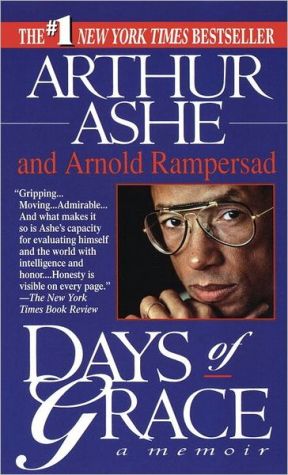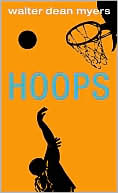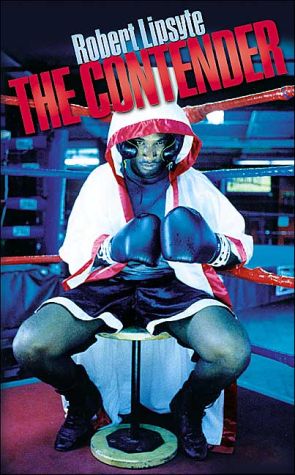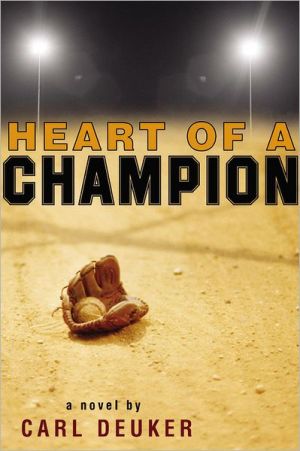Days of Grace: A Memoir
"Touching and courageous...All of it—the man, the life, the book—is rare and beautiful."\ COSMOPOLITAN DAYS OF GRACE is an inspiring memoir of a remarkable man who was the true embodiment of courage, elegance, and the spirit to fight: Arthur Ashe—tennis champion, social activist, and person with AIDS. Frank, revealing, touching—DAYS OF GRACE is the story of a man felled to soon. It remains as his legacy to us all....\ AN ALTERNATE SELECTION OF THE BOOK-OF-THE-MONTH CLUB\ \ \...
Search in google:
"Touching and courageous...All of it—the man, the life, the book—is rare and beautiful."COSMOPOLITAN DAYS OF GRACE is an inspiring memoir of a remarkable man who was the true embodiment of courage, elegance, and the spirit to fight: Arthur Ashe—tennis champion, social activist, and person with AIDS. Frank, revealing, touching—DAYS OF GRACE is the story of a man felled to soon. It remains as his legacy to us all....AN ALTERNATE SELECTION OF THE BOOK-OF-THE-MONTH CLUBPublishers WeeklyIn this inspirational, eloquent autobiographical memoir, tennis great Ashe, who died earlier this year, describes his battle against AIDS, which he contracted from a blood transfusion during open-heart surgery, and tells of his struggle against racism. Written with Rampersad, biographer of Langston Hughes, the first-person narrative negates the conventional image of Ashe as cold and aloof, giving us instead a complex, vulnerable, emotional man. The death of his mother when he was six left "an emptiness in my soul.'' Ashe writes of his dependence on his wife Jeanne and recalls growing up under segregation in Virginia, which motivated his activist opposition to South Africa's apartheid. Politically outspoken, Ashe defends the distribution of condoms in schools, attacks demagogues like Al Sharpton and criticizes "the decline of the African American community'' and its "new order . . . based squarely on revenge, not justice, with morality discarded.'' The volume closes with a deeply moving letter to his six-year-old daughter Camera. Photos.
\ Publishers Weekly - Publisher's Weekly\ In this inspirational, eloquent autobiographical memoir, tennis great Ashe, who died earlier this year, describes his battle against AIDS, which he contracted from a blood transfusion during open-heart surgery, and tells of his struggle against racism. Written with Rampersad, biographer of Langston Hughes, the first-person narrative negates the conventional image of Ashe as cold and aloof, giving us instead a complex, vulnerable, emotional man. The death of his mother when he was six left "an emptiness in my soul.'' Ashe writes of his dependence on his wife Jeanne and recalls growing up under segregation in Virginia, which motivated his activist opposition to South Africa's apartheid. Politically outspoken, Ashe defends the distribution of condoms in schools, attacks demagogues like Al Sharpton and criticizes "the decline of the African American community'' and its "new order . . . based squarely on revenge, not justice, with morality discarded.'' The volume closes with a deeply moving letter to his six-year-old daughter Camera. Photos.\ \ \ \ \ School Library JournalYA-An introspective and poignant book that is well-worth reading. With the help of Langston Hughes's biographer, Ashe has written a very absorbing account of his life. He tells of his mother's death when he was six years old and the strong influence of his loving but demanding father that stood him in good stead when he entered the all-white world of tennis in the 1960s. He recounts his athletic career and the difficulties he experienced on the court with players such as John McEnroe and Jimmy Connors. But the major portion of the book focuses on the 1980s, during which time he had two heart operations and contracted the AIDS virus via a blood transfusion. Although not a homosexual, Ashe became a sympathetic activist for the gay community. He was very vocal in his last years, speaking out against prejudice towards AIDS victims, racism, apartheid, and U.S. policy towards Haitians wishing to enter this country. This is the inspiring story of a premier athlete and a fine human being who cared passionately about his profession, his family, and the causes he embraced.-Pat Royal, Crossland High School, Camp Springs, MD\ \ \ John MortArthur Ashe's death in February from pneumonia (related to his chronic heart disease and AIDS) gives a special poignancy to his memoir. Yet Days of Grace, written with the help of Rampersad, Langston Hughes' biographer, would have been interesting in any case. In the 1960s, Ashe broke the whites-only barriers of tennis to become the most successful Davis Cup player ever. (John McEnroe, under Ashe's captaincy, later broke Ashe's record.) Unlike McEnroe or Jimmy Connors, however, Ashe was cool on the court and reserved--even shy--when meeting the public. He did for tennis what Jackie Robinson did for baseball, but activism was difficult for him. (Ashe recalls a conversation with Jesse Jackson, in which Jackson observed, "Arthur, you're just not arrogant enough.") Ashe's memoir concentrates on the 1980s, during which he underwent two heart operations; the second involved the transfusion that gave him AIDS. Ashe was not gay, though contracting AIDS made him sympathethic to gay athletes and gay causes; his chapter on sexuality--though in some ways gratuitous--shows Ashe at his most perceptive. Ashe even considers all sides of an issue that hurt him: his "outing" by USA Today. Not least, Ashe's book succeeds as an exemplary sports memoir, rendering in detail his difficulties with McEnroe and Connors in Davis Cup competition. Ashe was a classy athlete, and his last words are gentlemanly and brave. He concludes with a message for his young daughter, Camera. She'll be proud of her father.\ \ \ \ \ Kirkus ReviewsA genuinely affecting testament from the quietly activist champion-athlete who died young this past February. With an unobtrusive assist from Rampersad (The Life of Langston Hughes, 1988), Ashe offers a thoughtful, if episodic, appreciation of his well-spent life. Opening with a replay of the distressing events leading up to his dramatic disclosure in April 1992 that he'd contracted AIDS from a blood transfusion following open-heart surgery ten years earlier, the author takes a leisurely and comfortably digressive stroll down memory lane, evenhandedly recalling—among other matters—just what it was like to be the first black to compete successfully in the predominantly white world of big-time tennis. The winner of three Grand Slam titles, Ashe developed heart disease that ended his pro career while still near the top of his game. Subsequently appointed captain of America's Davis Cup team, he proved there can be fulfilling life after sports. A low-key, albeit effective, advocate of racial justice and allied causes, the globe-trotting author enjoyed an uncommonly felicitous personal life. With time out for candid commentary on fellow touring pros (Connors, McEnroe, Smith, et al.), he includes a host of heartfelt tributes to his wife, parents, and others who helped him along an upward path. With considerable eloquence and dignity, Ashe also affirms the do-as- you-would-be-done-by precepts that sustained him. He closes with a poignant letter to his young daughter, which, though written in anticipation of death, looks to the future with some hope, as well as backward to her strong family roots. A class act that, sadly, will have no encore. (Thirty-two pages ofphotos—not seen) \ \








